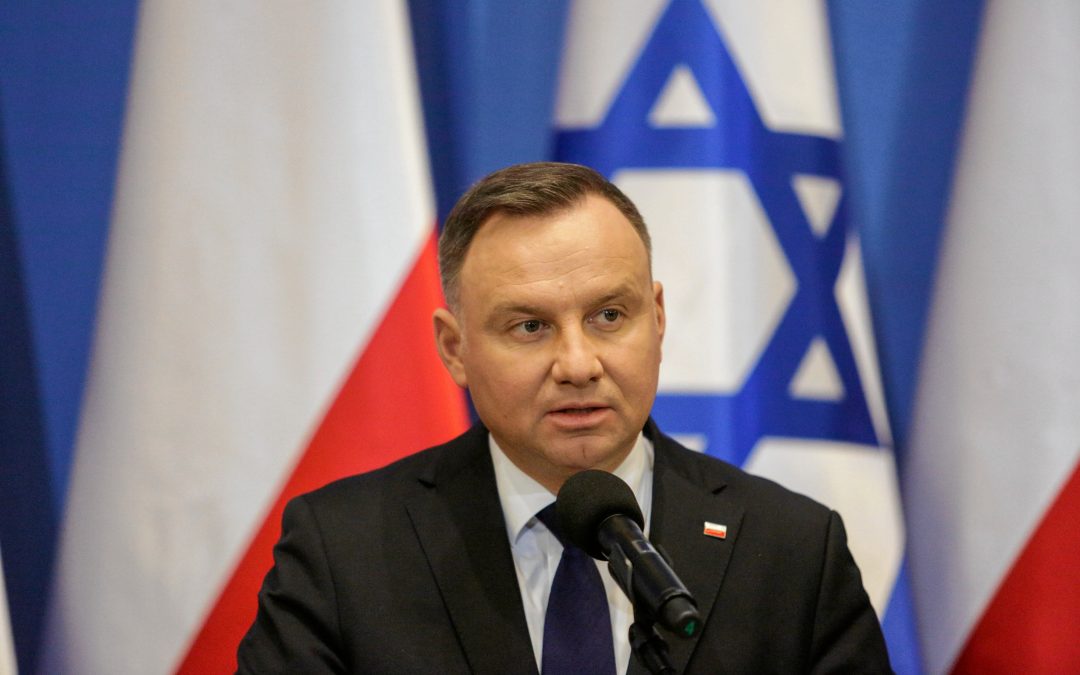Direct talks today between the presidents of Israel and Poland have paved the way for the two countries to restore their ambassadors to one another almost a year after they were withdrawn amid a dispute triggered by a Polish property restitution law that Israel labelled “antisemitic”.
In a statement this afternoon, Poland’s Andrzej Duda announced that, following talks with Israeli counterpart Isaac Herzog, they had jointly “announced the restoration of relations on ambassadorial level” as part of efforts to “put relations between the two countries back on track”.
Prezydent @AndrzejDuda rozmawiał dziś z Prezydentem Państwa Izrael @Isaac_Herzog. W trakcie rozmowy telefonicznej Prezydenci dyskutowali o swoim poparciu dla rozwoju stosunków dwustronnych między Polską i Izraelem. pic.twitter.com/WIVMaK52Ew
— Kancelaria Prezydenta (@prezydentpl) July 4, 2022
“Both presidents expressed the hope that all issues in bilateral relations would in the future be resolved through a sincere and open dialogue, in a spirit of mutual respect,” added Duda.
He noted that their agreement would see Poland appoint an ambassador to Israel “soon”. That position has been empty since last August, when the then incumbent, Marek Magierowski, came to Poland and was asked by Israel not to return. Magierowski was subsequently appointed as ambassador to the US.
Before Magierowski’s departure, Israel had also withdrawn its highest-ranked diplomat in Warsaw, chargé d’affaires Tal Ben-Ari Yaalon, and instructed its newly appointed ambassador, Yacov Livne, to remain in Israel.
The row had been triggered by Poland introducing a law that prevents restitution claims by some Holocaust survivors. Israel’s then foreign minister (and current prime minister), Yair Lapid, called it “antisemitic and immoral”. The US administration also expressed “deep concern” over the law.
The Polish government has defended the restitution law, which was passed with cross-party support. It argues that the measures are necessary to end legal uncertainty and denies that they discriminate against Jewish claimants. It accused the Israeli government of stirring “hatred of Poland and Poles”.
Relations began thawing in November, when Israel returned Ben-Ari to Warsaw. At the end of February, Livne also finally arrived, to support efforts to evacuate Israelis from Ukraine. However, he has still not formally presented his credentials, something Duda now says will happen “in the coming days”.
Last month, during a visit to the Catholic University of Lublin, Livne called for the “building of bridges of mutual understanding” between Israelis and Poles through “dialogue, education and cooperation”, especially among young people.
However, shortly before that, Israel had announced that it was cancelling Holocaust education trips to Poland, claiming that the Polish government was seeking to “dictate what was and wasn’t allowed to be taught” on them.
Last week, Poland’s education minister announced that he would prefer for all groups visiting former Nazi-German camps located in what is now Poland to be shown around only by Polish guides, in order to avoid “distortions” of Holocaust history.
Main image credit: Adrianna Bochenek / Agencja Gazeta

Daniel Tilles is editor-in-chief of Notes from Poland. He has written on Polish affairs for a wide range of publications, including Foreign Policy, POLITICO Europe, EUobserver and Dziennik Gazeta Prawna.




















